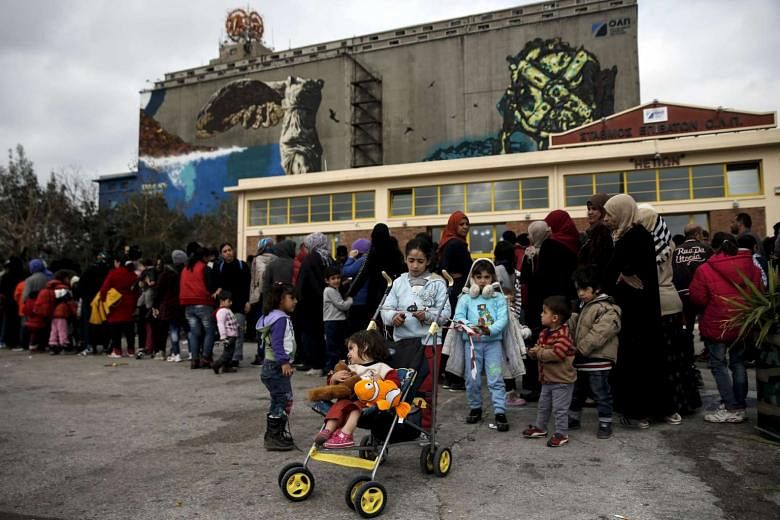ATHENS (REUTERS) - Mohammed Asif and his family have no food, no shelter and no security. "Home", for now, is a thin green blanket spread over a piece of plastic on a pavement in a grimy neighbourhood of the Greek capital.
Mr Asif, who though 43 looks at least 20 years older, is one of thousands of Afghans trapped in Greece, their hopes of reaching sanctuary in northern Europe dashed by a cascade of border shutdowns from Austria to Macedonia.
"We are desperate. We left Afghanistan because we are Hazaras and the Taleban threatened to kill us, my entire family," he said. "What will we do now?"
Most of the 400 Afghans vying for limited pavement space in Athens' Victoria Square are Hazaras, an ethnic minority who have long suffered discrimination and persecution back home, with thousands massacred by Taleban militias in the 1990s.
Asif, his wife and their two children, aged 10 and 13, have been sleeping rough for three days.
The Greek state, inundated by an influx of trapped refugees which was at the last count at least 22,000, is clearly absent from Victoria, a once upmarket area of Athens that has now sunk into disrepute.
Drug dealing and prostitution are rampant. There are no public facilities and soiled nappies are strewn on a sidewalk next to bins brimming with rubbish. A Christian charity distributes biscuits and orange juice, and the occasional local turns up with a saucepan of food.
Further down, young mothers with month-old babies sat on the sidewalk. A man held a child aged about 10 in his arms, looking stonily ahead.
"I'll stay here until Macedonia opens its borders," said Ali Khan Ranjbar, 28, from Ghazni, a city in central Afghanistan and a Hazara like Asif.
As of Feb 20, crossings of Afghans to Macedonia have ceased, with witnesses reporting migrants being forcibly removed from border outposts and sent by buses back to Athens.
On Monday Macedonian police fired tear gas to disperse hundreds of migrants who stormed the border from Greece as a deeply divided Europe traded barbs over how to tackle its biggest humanitarian crisis in decades.
According to United Nations data, about a quarter of the one million refugees and migrants who fled their homes to head to Europe last year were Afghans.
"I don't have any more money. I paid US$10,000 (S$14,067) to get to Europe ... I want to go to Germany or Sweden or Austria for my kids to have a better future," said Asif.
But German Chancellor Angela Merkel is under heavy pressure at home to end her open-door policy towards migrants. Sweden is rethinking its asylum policy and Austria last week capped the number of asylum claims at 80 per day.

